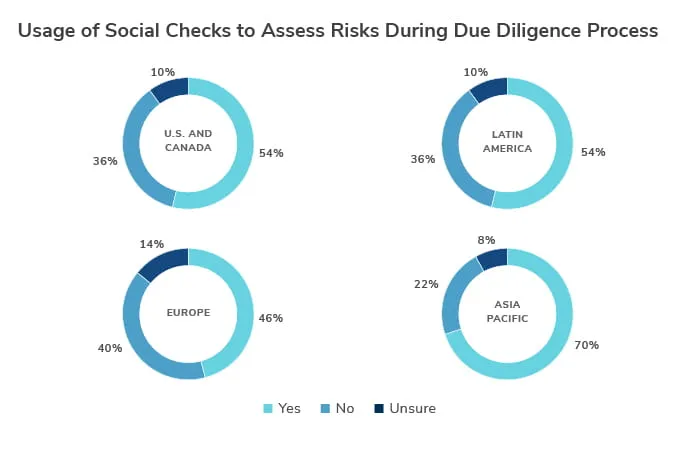Recently, social media has become an important component to understand a third-party’s online footprint. Social media searches can be used to help manage ABC risk and is increasingly becoming part of ethics and compliance programs.
In data from Kroll’s January ABC survey, 40% of respondents said they use social media searches among data sources to identify or validate level of third-party risk for each party of concern. The same survey had social media searches ranked 10th among 16 data sources used as part of the respondents’ enhanced due diligence protocol. Main data sources before social media searches were public record (fraud, criminal record, bankruptcy, etc.), the internet, international screening database, including sanctions and restricted party watch-lists, adverse media or real time news, politically exposed persons (PEP) content, country or industry risk scores, cyber security breaches/vulnerability scores, credit rating or credit risk scores and data of financial holdings.
In August 2021, Kroll surveyed an additional 200 global respondents to see how sentiment had changed from the first half of the year and specifically asked respondents about social media checks as part of ABC programs’ third-party enhanced due diligence. Overall, 56% of respondents across APAC, Europe, Latin America and the U.S. and Canada indicated that their organization conducted social media checks when assessing potential third-party risks–clients, customers, vendors–during the due diligence process.
An interesting trend in responses from our second survey showed that respondents in the APAC region (70%) are more likely to include social media checks during the due diligence process than respondents in Latin America and the U.S. and Canada (54%). Respondents in the European region (46%) are the least likely to conduct social media checks as part of their ABC due diligence of third-party risks.

One reason for APAC’s emphasis on social media checks could be explained by the large size of its employment market as a growth market with a large workforce, a significant turnover, and the consistency of pre-employment background checks. Social media checks tend to provide more relevant information as part of ABC when it comes to individuals. While this may not be the only explanation, it could certainly be part of the reason. The APAC region also features jurisdictions, such as Indonesia, where many businesses have a social media profile rather than a website and social media checks are consequently the most relevant.
Overall, compliance professionals seem to rely on social media checks more, in jurisdictions where access to publicly available information is less assured or where companies use social media rather than a website to provide their services and contact.
Social media information highlights money laundering, corruption and reputational risks not always identified through standard public domain information, including public record, internet and media, and litigation and regulatory repositories. As social media checks may help identify regulatory risks such as high-risk business, political connections, insider trading risks, connections to extremist or organized crime groups, they could also take more prominence among screening solutions for environmental, social and governance (ESG) requirements. While social media may not be as widely used as other sources, it certainly has a role to play in ABC programs.

